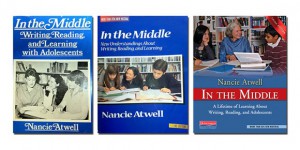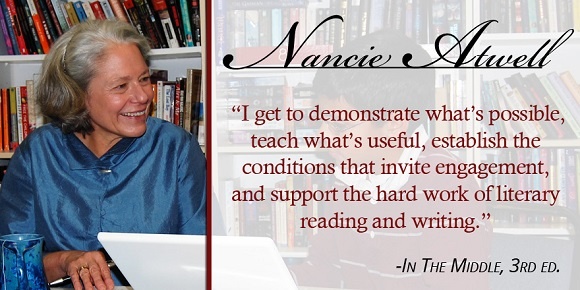
The third, updated edition of Nancie Atwell’s In The Middle releases today! In a special series, Nancie blogs for Heinemann every Wednesday. In today’s post, Nancie relays her experience teaching genre writing and how it empowers students’ creativity and advocacy.
The genres you teach your student writers seem exceptionally thoughtful and authentic: poetry of all kinds, memoirs, reviews, essays, profiles, advocacy journalism, humor and homage, and short fiction. You describe in the book how you changed the way you teach fiction. Can you talk a bit about that?
I believe I’ve read more bad student fiction than any English teacher on Earth, although I suspect others who suffer the genre would beg to differ. Initially, the problem with my kids’ short stories was a lack of plausibility: these were wild and woolly daydreams on paper.
In response, I built a short-fiction genre study, one with established ground rules. Students were required to generate specific, credible information—about main character, problem, setting, plot, and resolution—before they could start a story. While the realistic fiction that resulted was believable and coherent, it was also predictable, formulaic, and not much fun to write or read.
I'm grateful to Leigh Peake, then my editor at Heinemann, who gave me a copy of Jerome Stern's Micro Fiction, an anthology of stories of three hundred words or fewer. When I introduced the new genre to my students, they took off with it. The short short fiction that emerged was surprising, fresh, funny, and memorable.
I discovered other anthologies and collections of micro fiction, as well as flash fiction and sudden fiction, and a new genre study took shape. This one embraced many types of fiction, from romance and fantasy to mystery, horror, humor, action/adventure, and dystopian scifi. These were the kinds of stories my students were yearning to spin.
I made a mistake when I emphasized information as a basis for imaginative writing. Information is one foundation of effective memoirs, reviews, essays, even poems, but fiction is the literature of make-believe. Because of the length limits of the new forms, my students didn’t have room to create the wild and woolly daydreams of yore. Micro fiction demands that writers use language with precision, cut to the chase, resolve their plots, and conclude with resonance.
In their new book, The App Generation, Howard Gardner and Katie Davis call for opportunities for teenaged students to write stories of the “not everyday.” Short short stories transcend the mundane. They give today’s adolescents sorely-needed occasions to stretch their imaginations, and they make it possible for kids to craft literary fiction.

How did you decide to teach advocacy journalism as a genre?
Most of the writing I do is persuasive: with every book, speech, article, or blog post, I’m telling stories about my classroom in an effort to convince others to believe what I believe and act as I act. I’m not alone.
Our culture is rich with persuasive genres—grant proposals and fund-raising appeals, letters-to-the-editor and op ed essays, advertising copy and scripts for commercials, position papers, legal briefs, petitions, business proposals, all kinds of reviews, and all the books, speeches, articles, blog posts, and TED talks that describe problematic situations and call for reforms.
Persuasive writing is an important genre for students to experience because it gives writers opportunities to take on a problem, take a position, explore solutions, and, perhaps, make the world a better place. A problem for English teachers is how to create occasions for persuasion that feel genuine, purposeful, and engaging. This is why advocacy journalism became a genre in my writing workshop.
When a Maine foundation announced a Partners in Philanthropy project designed to invite students to investigate and contribute to a Maine non-profit organization, I applied for and received a grant of $1,000. I designed a genre study that involved my kids identifying local NPO’s, selecting one whose work they believed in, and writing about it so persuasively that CTL’s students of grades 1-6 would vote to award it one of three small grants of $333.33.
During the study, kids talk with their parents about non-profits they value, schedule and conduct on-site visits and interviews, take notes and organize their data, draft and craft presentations, deliver them to real audiences, and experience the power of persuasive writing in an authentic, significant context. The stories they tell are moving and powerful.
Even better, some students become active in the non-profits they investigate. In the new book, I include persuasive essays by three kids, Parker, Sophia, and John, who became volunteers, respectively, for the organizations Rebuilding Together, Feed Our Scholars, and Camp Kieve’s program for returning veterans of Iraq and Afghanistan. Through the power of their research and writing, they convinced themselves.
As writing teachers, we’re at a critical juncture. We can use the bureaucratic language of the standards movement to focus on goals that are bereft of personal meaning and writing assignments that are, at best, empty exercises, or we can approach writing as one of the humanities and invite students to engage in worthwhile work that teaches them both how to write and how to make the world a better place.
This blog post is part of the In The Middle Wednesdays series. Please visit http://www.heinemann.com/InTheMiddle to learn more about the book and read chapter previews.


